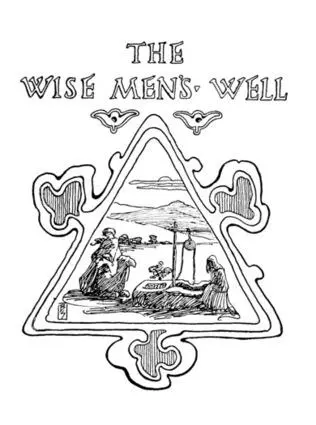“Look!” she commanded, and the Emperor raised his eyes and saw. The vaulted heavens opened before his eyes, and his glance traveled to the distant Orient. He saw a lowly stable behind a steep rock wall, and in the open doorway a few shepherds kneeling. Within the stable he saw a young mother on her knees before a little child, who lay upon a bundle of straw on the floor.
And the sibyl’s big, knotty fingers pointed toward the poor babe. “Hail, Cæsar!” cried the sibyl, in a burst of scornful laughter. “There is the god who shall be worshiped on Capitol Hill!”
Then Augustus shrank back from her, as from a maniac. But upon the sibyl fell the mighty spirit of prophecy. Her dim eyes began to burn, her hands were stretched toward heaven, her voice was so changed that it seemed not to be her own, but rang out with such resonance and power that it could have been heard over the whole world. And she uttered words which she appeared to be reading among the stars.
“Upon Capitol Hill shall the Redeemer of the world be worshiped,— Christ —but not frail mortals.”
When she had said this, she strode past the terror-stricken men, walked slowly down the mountain, and disappeared.
But, on the following day, Augustus strictly forbade the people to raise any temple to him on Capitol Hill. In place of it he built a sanctuary to the new-born God-Child, and called it Heaven’s Altar— Ara Cœli .

Table of Contents
In old Judea the Drought crept, gaunt and hollow-eyed, between shrunken thistles and yellowed grass.
It was summertime. The sun beat down upon the backs of unshaded hills, and the slightest breath of wind tore up thick clouds of lime dust from the grayish-white ground. The herds stood huddled together in the valleys, by the dried-up streams.
The Drought walked about and viewed the water supplies. He wandered over to Solomon’s Pools, and sighed as he saw that they still held a small quantity of water from their mountain sources. Then he journeyed down to the famous David’s Well, near Bethlehem, and found water even there. Finally, he tramped with shuffling gait toward the great highway which leads from Bethlehem to Jerusalem.
When he had arrived about half-way, he saw the Wise Men’s Well, where it stands close by the roadside. He saw at a glance that it was almost dry. He seated himself on the curb, which consists of a single stone hollowed out, and looked into the well. The shining water-mirror, which usually was seen very near the opening, had sunk deep down, and the dirt and slime at the bottom of the well made it muddy and impure.
When the Well beheld the Drought’s bronzed visage reflected in her clouded mirror, she shook with anguish.
“I wonder when you will be exhausted,” said the Drought. “Surely, you do not expect to find any fresh water source, down there in the deep, to come and give you new life; and as for rain—God be praised! there can be no question of that for the next two or three months.”
“You may rest content,” sighed the Well, “for nothing can help me now. It would take no less than a well-spring from Paradise to save me!”
“Then I will not forsake you until every drop has been drained,” said the Drought. He saw that the old Well was nearing its end, and now he wanted to have the pleasure of seeing it die out drop by drop.
He seated himself comfortably on the edge of the curb, and rejoiced as he heard how the Well sighed down there in the deep. He also took a keen delight in watching the thirsty wayfarers come up to the well-curb, let down the bucket, and draw it up again, with only a few drops of muddy water.
Thus the whole day passed; and when darkness descended, the Drought looked again into the Well. A little water still shimmered down there. “I’ll stay here all night,” cried he, “so do not hurry yourself! When it grows so light that I can look into you once more, I am certain that all will be over with you.”
The Drought curled himself up on the edge of the well-curb, while the hot night, which was even more cruel, and more full of torment than the day had been, descended over Judea. Dogs and jackals howled incessantly, and thirsty cows and asses answered them from their stuffy stalls.
When the breeze stirred a little now and then, it brought with it no relief, but was as hot and suffocating as a great sleeping monster’s panting breath. The stars shone with the most resplendent brilliancy, and a little silvery new moon cast a pretty blue-green light over the gray hills. And in this light the Drought saw a great caravan come marching toward the hill where the Wise Men’s Well was situated.
The Drought sat and gazed at the long procession, and rejoiced again at the thought of all the thirst which was coming to the well, and would not find one drop of water with which to slake itself. There were so many animals and drivers they could easily have emptied the Well, even if it had been quite full. Suddenly he began to think there was something unusual, something ghost-like, about this caravan which came marching forward in the night. First, all the camels came within sight on a hill, which loomed up, high and distinct, against the horizon; it was as though they had stepped straight down from heaven. They also appeared to be larger than ordinary camels, and bore—all too lightly—the enormous burdens which weighted them.
Still he could not understand anything but that they were absolutely real, for to him they were just as plain as plain could be. He could even see that the three foremost animals were dromedaries, with gray, shiny skins; and that they were richly bridled and saddled, with fringed coverings, and were ridden by handsome, noble-looking knights.
The whole procession stopped at the well. With three sharp jerks, the dromedaries lay down on the ground, and their riders dismounted. The pack-camels remained standing, and as they assembled they seemed to form a long line of necks and humps and peculiarly piled-up packs.
Immediately, the riders came up to the Drought and greeted him by laying their hands upon their foreheads and breasts. He saw that they wore dazzling white robes and huge turbans, on the front of each of which there was a clear, glittering star, which shone as if it had been taken direct from the skies.
“We come from a far-off land,” said one of the strangers, “and we bid thee tell us if this is in truth the Wise Men’s Well?”
“It is called so to-day,” said the Drought, “but by to-morrow there will be no well here. It shall die to-night.”
“I can understand this, as I see thee here,” said the man. “But is not this one of the sacred wells, which never run dry? or whence hath it derived its name?”
“I know it is sacred,” said the Drought, “but what good will that do? The three wise men are in Paradise.”
The three travelers exchanged glances. “Dost thou really know the history of this ancient well?” asked they.
“I know the history of all wells and fountains and brooks and rivers,” said the Drought, with pride.
“Then grant us a pleasure, and tell us the story!” begged the strangers; and they seated themselves around the old enemy to everything growing, and listened.
The Drought shook himself and crawled up on the well-curb, like a story-teller upon his improvised throne, and began his tale.
“In Gebas, in Media, a city which lies near the border of the desert—and, therefore, it has often been a free and well-beloved city to me,—there lived, many, many years ago, three men who were famed for their wisdom.
Читать дальше













